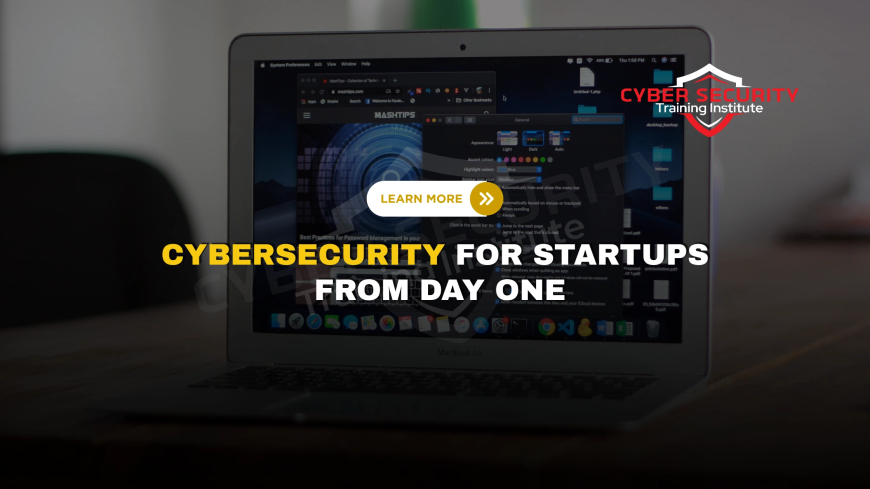Why Should Startups Invest in Cybersecurity from Day One?
Startups are the lifeblood of innovation, building exciting new products and services in a fast-paced, digital world. But with this digital-first approach comes a hidden danger: cyber threats. From data breaches to phishing scams, cybercriminals target startups for their valuable data and often limited defenses. Investing in cybersecurity from day one isn’t just a technical necessity—it’s a business imperative that protects your reputation, customers, and bottom line. This blog explores why startups must prioritize cybersecurity from the start, offering practical steps and insights to build a secure foundation for growth.

Table of Contents
- Why Cybersecurity Matters for Startups
- Risks of Ignoring Cybersecurity
- Benefits of Early Cybersecurity Investment
- Key Cybersecurity Measures for Startups
- Cost-Effective Cybersecurity Strategies
- Building Trust with Customers
- Challenges for Startups
- Real-World Examples
- The Future of Cybersecurity for Startups
- Conclusion
- Frequently Asked Questions
Why Cybersecurity Matters for Startups
Cybersecurity is the practice of protecting digital systems, networks, and data from unauthorized access or attacks. For startups, this means safeguarding customer information, intellectual property, and business operations. Many startups operate online, storing sensitive data like user profiles, payment details, or proprietary technology. Cybercriminals see startups as easy targets due to their limited resources and focus on growth over security. A single breach can derail a startup’s progress, making early investment in cybersecurity critical to long-term success.
Common cyber threats startups face include:
- Phishing: Fake emails or messages tricking employees into sharing sensitive information.
- Ransomware: Malware that locks data, demanding payment to restore access.
- Data Breaches: Unauthorized access to customer or business data.
- DDoS Attacks: Overloading websites or servers to disrupt services.
By prioritizing cybersecurity from the outset, startups can avoid costly setbacks and build a secure foundation.
Risks of Ignoring Cybersecurity
Neglecting cybersecurity can have devastating consequences for startups:
- Financial Loss: Breaches can lead to stolen funds, ransom payments, or legal penalties.
- Reputational Damage: A security incident can erode customer trust, driving them to competitors.
- Legal Consequences: Failing to protect customer data can violate regulations like GDPR, leading to fines.
- Operational Disruption: Attacks like ransomware can halt operations, delaying product launches or services.
- Loss of Intellectual Property: Stolen proprietary technology can undermine a startup’s competitive edge.
These risks highlight why cybersecurity isn’t an afterthought but a priority from day one.
Benefits of Early Cybersecurity Investment
Investing in cybersecurity early offers startups significant advantages:
- Customer Trust: Strong security builds confidence, encouraging customer loyalty.
- Cost Savings: Preventing breaches is cheaper than recovering from them.
- Regulatory Compliance: Early measures ensure adherence to data protection laws.
- Competitive Advantage: Security-conscious startups stand out in crowded markets.
- Scalability: A secure foundation supports growth without major overhauls later.
These benefits make cybersecurity a strategic investment that fuels long-term success.
Key Cybersecurity Measures for Startups
Startups can implement practical cybersecurity measures to protect their operations. The following table outlines essential steps:
| Cybersecurity Measure | Description | Benefit for Startups |
|---|---|---|
| Multi-Factor Authentication (MFA) | Requires multiple verification steps to access systems. | Prevents unauthorized access to sensitive data. |
| Data Encryption | Scrambles data to make it unreadable without a key. | Protects customer and business data if intercepted. |
| Regular Software Updates | Patches vulnerabilities in apps and systems. | Closes gaps that hackers could exploit. |
| Employee Training | Educates staff on recognizing phishing and safe practices. | Reduces human error, a common cause of breaches. |
| Incident Response Plan | Outlines steps to handle cyber incidents. | Minimizes damage and speeds recovery. |
These measures provide a strong starting point for startups to secure their operations.
Cost-Effective Cybersecurity Strategies
Startups often operate on tight budgets, but cybersecurity doesn’t have to break the bank. Cost-effective strategies include:
- Use Free Tools: Leverage open-source software like firewalls or password managers.
- Cloud-Based Solutions: Opt for affordable, scalable cloud security services.
- Prioritize Basics: Focus on essentials like MFA and encryption before advanced tools.
- Outsource to Experts: Partner with cybersecurity firms for affordable, expert support.
- Train In-House: Use free online resources to educate employees on security practices.
These approaches allow startups to build robust defenses without straining resources.
Building Trust with Customers
Cybersecurity is a key factor in earning and retaining customer trust. Startups can:
- Be Transparent: Share how customer data is protected through privacy policies.
- Communicate Security: Highlight security features in marketing to build confidence.
- Respond Quickly: Address any incidents promptly to maintain trust.
- Certifications: Pursue certifications like ISO 27001 to show commitment to security.
By prioritizing cybersecurity, startups demonstrate they value their customers’ safety, fostering loyalty.
Challenges for Startups
Implementing cybersecurity from day one comes with challenges:
- Limited Budgets: Startups may struggle to afford advanced tools or staff.
- Lack of Expertise: Founders often lack the technical knowledge to implement security.
- Time Constraints: Rapid growth can push cybersecurity to the back burner.
- Evolving Threats: Keeping up with new attack methods is daunting.
- Balancing Growth and Security: Focusing on product development can overshadow security needs.
Despite these hurdles, startups can overcome them by starting small and scaling security as they grow.
Real-World Examples
Startups that prioritize cybersecurity see tangible benefits:
- A fintech startup implemented MFA from launch, preventing a phishing attack that targeted customer accounts.
- A health tech company encrypted patient data, avoiding penalties during a compliance audit.
- An e-commerce startup trained employees on phishing, reducing scam-related losses by 90%.
These examples show that early cybersecurity investments pay off in protection and credibility.
The Future of Cybersecurity for Startups
As technology evolves, so will cybersecurity needs. Future trends include:
- AI-Powered Security: Using AI to detect and respond to threats in real time.
- Zero Trust Models: Verifying every user and device to prevent insider threats.
- Cloud-Native Security: Tools designed for cloud-based startups will become standard.
- Regulatory Growth: Stricter data protection laws will push startups to prioritize compliance.
By staying ahead of these trends, startups can build resilient, future-proof defenses.
Conclusion
For startups, investing in cybersecurity from day one is not just a precaution—it’s a strategic move that protects their business, customers, and reputation. Cyber threats like phishing, ransomware, and data breaches pose significant risks, but early action can prevent costly consequences. By implementing basic measures like MFA and encryption, leveraging cost-effective tools, and fostering a security-first culture, startups can build trust and ensure long-term success. While challenges like limited budgets exist, the benefits of early investment far outweigh the costs. As cyber threats evolve, startups that prioritize cybersecurity will be better positioned to thrive in a competitive, digital world.
Frequently Asked Questions
Why do startups need cybersecurity?
Startups handle sensitive data and are often targeted by cybercriminals due to limited defenses, making cybersecurity essential.
What is a data breach?
A data breach is when hackers gain unauthorized access to sensitive information, like customer or business data.
How does cybersecurity affect customer trust?
Strong cybersecurity shows customers their data is safe, building loyalty and confidence in your startup.
What is phishing?
Phishing involves fake emails or messages that trick users into sharing sensitive information, like passwords.
Can startups afford cybersecurity?
Yes, startups can use free tools, cloud-based solutions, or outsource to experts for affordable security.
What is multi-factor authentication (MFA)?
MFA requires multiple verification steps, like a password and a code, to access systems securely.
Why is encryption important?
Encryption scrambles data, making it unreadable to hackers, protecting sensitive information.
What is ransomware?
Ransomware is malware that locks data, demanding payment to restore access, disrupting operations.
How can startups train employees on cybersecurity?
Use free online resources or workshops to teach staff about phishing, passwords, and safe practices.
What is a DDoS attack?
A DDoS attack overloads a startup’s website or servers, disrupting services and customer access.
Can cybersecurity give startups a competitive edge?
Yes, strong security attracts customers and sets you apart in markets where trust is critical.
What is an incident response plan?
It’s a strategy outlining how to detect, respond to, and recover from cyber incidents quickly.
Are cloud-based security solutions safe?
Yes, reputable cloud solutions offer scalable, affordable security tailored to startups.
What are the legal risks of poor cybersecurity?
Failing to protect data can lead to fines for violating regulations like GDPR or CCPA.
How does AI improve startup cybersecurity?
AI detects threats in real time, automates responses, and predicts vulnerabilities, enhancing protection.
Can startups outsource cybersecurity?
Yes, partnering with cybersecurity firms provides expert support at a lower cost than in-house teams.
What is zero trust security?
Zero trust verifies every user and device before granting access, reducing insider threat risks.
How often should startups update software?
Regular updates, ideally monthly, patch vulnerabilities to keep systems secure.
Can cybersecurity certifications help startups?
Certifications like ISO 27001 demonstrate a commitment to security, boosting customer trust.
How do startups stay ahead of cyber threats?
By adopting new technologies, training staff, and monitoring emerging threats, startups can stay proactive.
What's Your Reaction?
 Like
0
Like
0
 Dislike
0
Dislike
0
 Love
0
Love
0
 Funny
0
Funny
0
 Angry
0
Angry
0
 Sad
0
Sad
0
 Wow
0
Wow
0







![How to Install RHEL 10 on VMware/VirtualBox [Tutorial]](https://www.cybersecurityinstitute.in/blog/uploads/images/202509/image_430x256_68b56dc967a4a.jpg)








